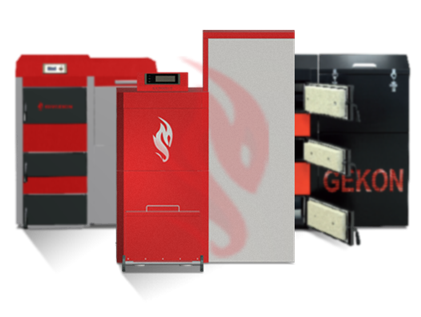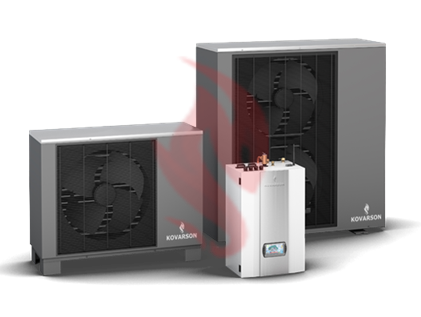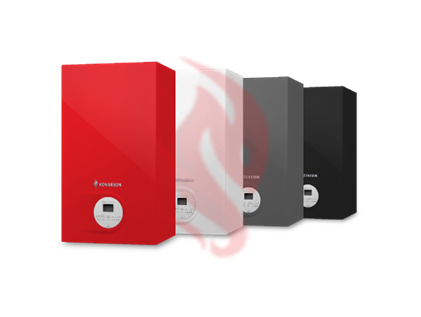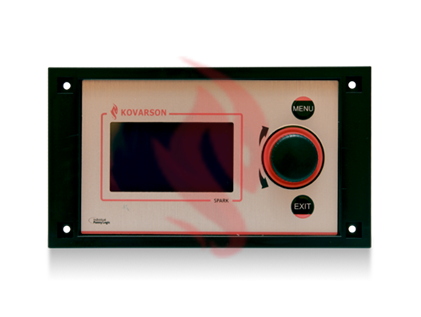The Czech MAKAK boiler provides economical and environmentally-friendly heating for houses, business premises and medium-large buildings, and is often used for heating water as well. The boiler can gasify wood, chips, briquettes and other wood waste. The combustion chamber takes pieces of wood up to 55 cm long!
Gasification boilers are very different from traditional solid fuel boilers due to the environmentally-friendly heating. The boilers meet emission class 5 under the EN 303-5 standard - the strictest values for emissions released from a boiler into the atmosphere. This combustion system is above all highly economical. Fuel savings are as high as 40% compared to standard wood boilers that do not work on the basis of gasification. The boilers achieve efficiency levels of up to 92%!
Thanks to the high levels of efficiency and large feeding chamber, the boiler is easy to feed. The feeding chamber is large enough for about 8 to 12 hours of operation at medium output. In energy-saving mode the boiler will keep going for up to 24 hours. The comfort comes from the fact that you will need to feed the boiler only twice a day at medium output. The boilers must be installed with a storage tank. We recommend a tank of about 50 litres for every 1 kW of boiler output. The tank size determines heat energy use for up to several days. The boiler can be regulated by a room thermostat which opens and closes the mixing valve or switches off the central heating circulation pump.
BOILER DESIGN
The inner boiler body is welded from high quality 6mm boiler plate. We use 8 mm plate for the most stressed and critical parts. The plate for the outer body is 4 mm thick. The feeding chamber is fitted with 3 mm stainless steel inserts. They protect the boiler from condensates and tar, prolonging its working life. The upper part houses the feeding chamber, which has a refractory concrete section at the bottom with a nozzle for the gas to go through.
The hot gases pass through the concrete to a burn-out area made of vermiculite and refractory concrete. The main heat exchanger tube with walls 6.1 mm thick lines the rear wall of the boiler, with the upper part opening into a collection tube, after which the cooled gases go out to the chimney. The tubes are fitted with turbulators for easy, problem-free cleaning.
BOILER PROTECTION
Boilers must be connected to a storage vessel in order to allow any excess energy to escape to store heat energy. Protection is also provided at the boiler outlet by a thermostat which shuts off the fan, switches on all pumps and opens all of the mixing valves when the temperature passes the 95°C mark. The cooling loop is an additional feature. If the boiler temperature passes the 95°C mark, the cooling loop's bimetal thermostat opens a valve, releasing cold water into the boiler from the water supply and draining hot water from the other side.
BOILER OPERATION:
The principle of two-stage combustion at high temperature is applied. Burning is encouraged by an exhaust fan which blows primary air into the feeding chamber and secondary air into the nozzle. The wood is gasified in the feeding chamber, producing wood gas. The wood gas is sucked into the nozzle by the secondary air and burned in the space below the nozzle. The hot gases then pass through the main rear heat exchanger tube, where they transfer most of their energy, and the cooled gases go out to the chimney through the collection tube. The boilers are fitted with an exhaust fan which goes to full speed after the feeding door is opened, and sucks all of the smoke into the chimney through the air chamber located above the feeding chamber so that it does not get into the boiler room. Cleaning a boiler with turbulators using the handle on the side of the boiler. Lifting the turbulators causes any deposits to fall down from the tubes into the ashtray area. The cleaning can be performed on both the right and the left side of the boiler. The ash remaining in the feeding chamber can be collected through the ignition doors. The rest of the ash can be collected through the lower ashtray openings.
BOILER REGULATION:
New generation controls provide users with an intuitive menu, simple regulation and a range of functions. The units have a good layout and include both user and service interfaces.
Combustion is regulated by adjusting the speed of the fan and by using rods to control the primary and secondary air, with settings from 0 to 10.
The desired boiler temperature is maintained automatically, as are the storage tanks in a given place and the temperature of the hot water tank. The option of using room thermostats - working independently for each heating circuit - is helpful for maintaining a comfortable temperature in the heated rooms.
The basic features of a unit include regulation of one mixing valve and up to 4 pumps, and the option of connecting a Sparkster room thermostat or any universal thermostat operating with wires or on a wireless basis. Units can be extended with further modules to regulate up to 5 mixing valves, as long as the external sensors are capable of controlling the mixing valves properly. The unit can also be regulated over the Internet using a module.



















 Nová zelená úsporám
Nová zelená úsporám